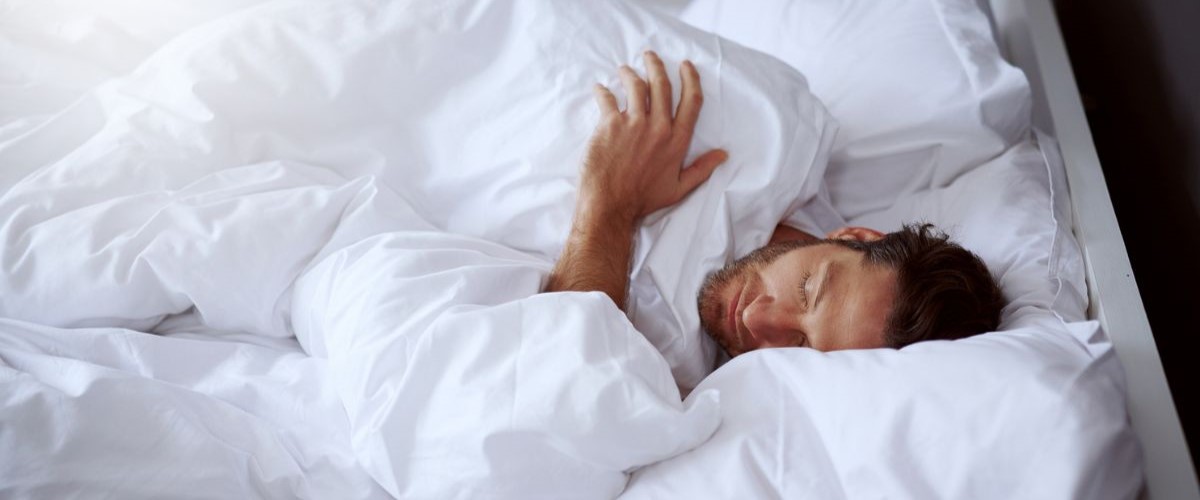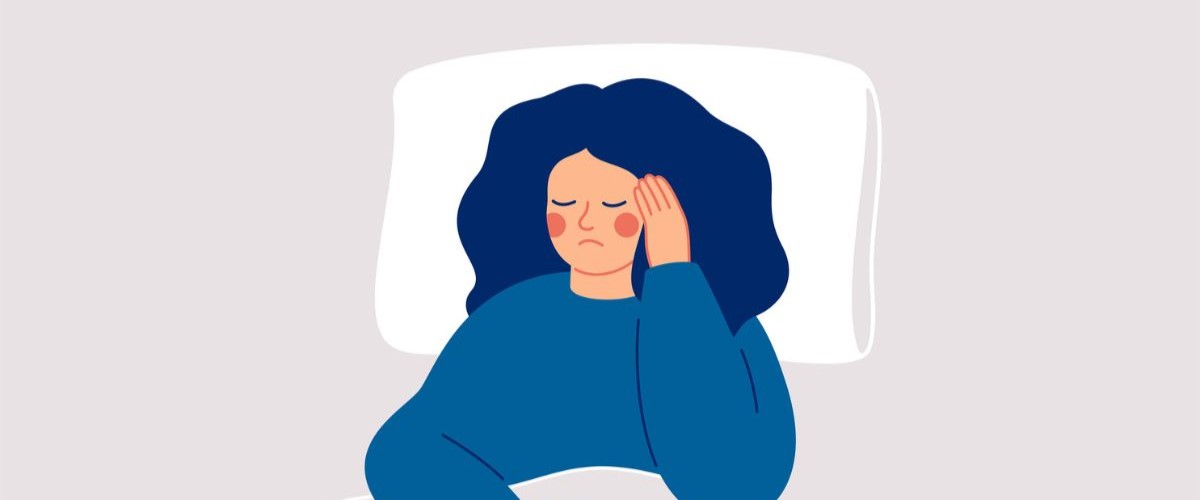Get the Zs you deserve: 6 common sleeping myths put to bed
Could falling for a common sleep myth be where we're going wrong? We're setting the record straight so you get the best from the land of nod

Sleep is one of our most natural and basic needs, but for many of us this simple act can at times feel out of reach. And this isn’t great news for our emotional or physical health.
“Good sleep is a foundation for good health and a happier frame of mind,” according to Vitality partner and meditation app Headspace. Sadly, however, almost 1 in 5 people in the UK aren’t getting enough sleep.
But sleep is the gateway to a host of benefits, from boosting our immune system to warding off the risks of heart disease and improving our mental wellbeing. And given that we spend around one-third of our lives in slumberland, it's a good idea to consider whether we are doing it properly.
So, to make sure you are getting the Zs you need, we’re putting some sleep myths to bed, once and for all.
‘Once a poor sleeper, always a poor sleeper’
For some of us, even the idea of getting into bed can cause anxiety. Around one-third of Brits suffer from insomnia, whereby you struggle to fall asleep or stay asleep long enough to wake up feeling rested.
But fear not, there are some ways that you can improve your sleep pattern that are relatively simple to adopt. Altering your sleep habits such as through exercising regularly and spending time outside can help to improve insomnia.
Dr Roshane Mohidin, Vitality’s Head of Health Improvement and NHS GP, says that getting active in the daytime can provide “a natural boost to your sleep hormone melatonin and improve sleep quality at night.”
Aerobic activity, such as going for a walk or run, has been proven to be particularly effective in helping to alleviate symptoms of insomnia. This type of exercise is proven to tire you out and help you get a deeper sleep as doses of natural daylight regulate your body clock.
That being said, it might not happen overnight. Even though studies do show that physical activity can have immediate positive effects, research suggests that the full benefits to our sleep kick in over time.
‘We can catch up on sleep’
If you have been experiencing one too many late nights or having a few bad night’s sleep, you could be suffering from sleep debt. Otherwise known as ‘sleep deficit’, this is the difference between the amount of sleep needed compared with the total amount you get.
A common misconception is that we are able to catch up on sleep if we haven’t got our recommended seven hours. Sadly, however, if you’re behind on sleep, it’s not easily rectified by bingeing on Zs over the weekend.
One study found that weekend sleeping does not make up for lost metabolism caused by sleep debt, and can actually do more harm than good, as it disrupts our natural sleep pattern.
It’s recommended to aim for regular bed and wake times in order to recover from any sleep debt lost.
‘More sleep is good for you’
So, we’ve established that too little sleep isn’t great for us. But it’s also true that too much sleep can also be the catalyst for health risks, too.
Too much slumber can actually increase our health risk for coronary heart disease and diabetes, studies show. “We should aim to get between seven to nine hours of sleep every night,” explains Dr Roshane.
Getting more than this in one night can actually make us feel more tired the next day. To make sure that you are getting to bed at a reasonable hour, Dr Roshane recommends having a warm bath, or practicing some breathwork to help you wind down and improve your sleep quality.
Or if you are in need of an extra boost on a morning, you should try and get to bed earlier, avoid late-night snacking or try placing your alarm clock at the other side of the room to help get you out of bed.

‘A nightcap will do the trick’
Although some people find that alcohol can help them get off to sleep quicker, consuming alcohol especially in excess, according to Dr Roshane, can result in “poor quality sleep and affect how we function day-to-day”.
According to leading sleep and wellbeing experts, Headspace: “Alcohol alters what is called ‘sleep architecture,’ the natural flow of sleep through different stages such as deep sleep, REM sleep, and light sleep.”
Even a single glass of wine close to bedtime can result in:
- Lighter sleep
- Restlessness
- Shorter sleep time and quality
So, before fixing up a nightcap, perhaps reconsider your night-time beverage? Herbal teas, such as chamomile and peppermint, water and even cherry juice have all been found to promote sleepiness.
The humble glass of warm milk is also a great option to reduce stress and sooth the brain before bed, experts suggest.
If you are a member of Vitality with qualifying health insurance or life insurance plan you could get 12 months membership on us.
With the Headspace reward, you'll have access to hundreds of sleep casts and mental wellness resources. Plus, every time you complete a session, you will earn Vitality points.
All you need to do is log into Member Zone for more details. Want to become a member?
Visit vitality.co.uk to find the plan that’s right for you.
‘When I eat won’t impact my sleep’
Experts recommend eating your last meal – a mix of complex carbs and protein – at least three hours before going to bed. For example, one study showed that eating a diet rich in fibre and protein leads to deeper sleep.
This is because eating prompts the body to release insulin, which signals to your body to use food for energy, so if you do this late at night it can interfere with your sleep. Giving your digestive system plenty of time to kick-in will allow it to function and this can improve your ability to nod off.
But this doesn’t mean you should skip a meal, because it is always important to fuel your body with what it needs. And certain foods can disrupt our slumber, too.
Foods like citrus fruits, spicy or fried foods and heavy meals are hard work for our digestive system to process and can often trigger indigestion and even heartburn if eaten too close to bedtime.
All this begs the question: Does cheese really give us nightmares? While many consider this the stuff of old wives’ tales, studies suggest that this is more likely to be to do with the consumption of fatty food late at night.
Another theory, meanwhile, links it to the brain chemical tyramine which triggers neurotransmitters that can affect our sleep. However, considering this chemical is also found in chocolate - a food that isn’t associated with bad dreams - this idea might be a red-herring.
‘Napping is bad for you’
Taking a quick kip – or ‘disco nap’ – is a tool you can use to ensure you’re feeling alert and energised throughout the day. In fact, The Sleep Charity states that napping “can give you as much energy as two cups of strong coffee, but the effects are longer lasting”.
But that doesn’t mean you should be grabbing 40 winks every chance you get. A planned daytime nap can help improve alertness, mood and memory while relieving stress and fatigue.
But there are a few variables that Dr Roshane says you should bear in mind before getting your head down. “The important thing is to sleep no longer than 15-20 minutes as you can go into a deeper sleep if you sleep any longer which can lead to feeling groggier afterwards rather than more energised.”
He adds: “It is best to nap before 3pm to avoid interfering with night-time sleep and also try to nap in a restful sleep environment such as a dark and quiet room.”
If, after adopting some of these healthier sleeping habits, you’re still not getting enough sleep and it is affecting your daily life, Dr Roshane also suggests speaking to a GP.
“Your doctor is there to help find the underlying cause and discuss some options to improve your sleep” he concludes.
At Vitality, we’re all about encouraging our members to make small positive lifestyle choices that can make a big impact to their lives.
That’s why we offer partner benefits and rewards with a range of big brands when you get healthy.
Log into Member Zone or visit vitality.co.uk to find out more.
Recent articles

How to stay active in the winter months
Getting active at the best of time can be hard enough, let alone in the cold, wet winter months. Here are five ways to stay active at this time of year

Feeling lonely? 4 ways to combat loneliness this season
For all the fun and frolics of the festive season, for many it can bring an equal amount of heartache. So, why not lift your - or someone else’s - spirits this time of year with these simple tips?

The way to avoid festive burnout? Just say ‘no’
For all of its fun, the festive period can be incredibly stressful too. Hoping to escape burnout this holiday season? Try saying ‘no’, writes Jennifer Wallis
